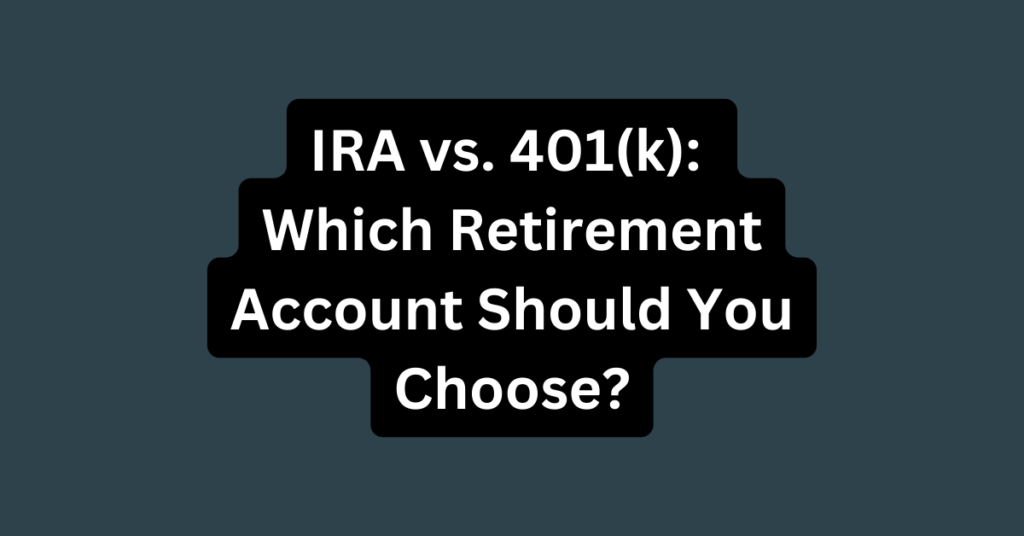When it comes to planning for retirement, choosing the right investment vehicle is crucial. Two popular options that often come into consideration are the Individual Retirement Account (IRA) and the 401(k) plan. Both offer tax advantages and opportunities for building a secure retirement, but they have distinct features and eligibility criteria. In this comprehensive guide, we’ll delve into the key differences and considerations to help you determine which retirement account is the best fit for your financial goals.

Understanding IRA and 401(k) Basics
Before we compare these retirement accounts, let’s start with the fundamentals:
1. Individual Retirement Account (IRA):
– Types: IRAs come in two main types: Traditional and Roth. Traditional IRAs offer tax deductions on contributions, while Roth IRAs provide tax-free withdrawals in retirement.
– Contribution Limits: As of 2021, the annual contribution limit for IRAs is $6,000 for those under 50 and $7,000 for individuals 50 and older.
– Eligibility: Most individuals, regardless of their employer, can open and contribute to an IRA.
– Investment Control: You have more control over investment choices within an IRA.
2. 401(k) Retirement Plan:
– Type: 401(k) plans are employer-sponsored retirement accounts.
– Contribution Limits: As of 2021, the annual contribution limit for 401(k) plans is $19,500 for those under 50 and $26,000 for individuals 50 and older.
– Eligibility: You can only participate in a 401(k) plan if your employer offers it.
– Employer Matching: Many employers offer matching contributions to 401(k) plans, essentially providing “free money” for your retirement.
Ready to Make the Right Choice for Retirement?
Explore Our Comprehensive Guide on IRA vs. 401(k). Join Our Free Retirement Planning Newsletter for Expert Advice, Bonus Podcasts, and Insights from Our Community!
Key Differences to Consider
Now, let’s explore the critical distinctions between IRAs and 401(k) plans:
1. Employer Involvement:
– IRA: These accounts are self-directed, meaning you establish and manage them independently.
– 401(k): 401(k) plans are offered and often managed by employers, with some degree of employee contribution.
2. Contribution Limits:
– IRA: Lower contribution limits compared to 401(k) plans.
– 401(k): Higher contribution limits, making it ideal for those looking to maximize their retirement savings.
3. Tax Treatment:
– IRA: Traditional IRAs offer tax deductions on contributions, while Roth IRAs provide tax-free withdrawals in retirement.
– 401(k): Contributions to traditional 401(k) plans are typically tax-deductible, and Roth 401(k) contributions are after-tax, allowing for tax-free withdrawals in retirement.
4. Employer Match:
– IRA: No employer matching contributions.
– 401(k): Many employers match a portion of your contributions, boosting your retirement savings significantly.
5. Investment Control:
– IRA: You have more control over your investment choices within an IRA, making it suitable for experienced investors.
– 401(k): Investment options are typically limited to a selection offered by the employer.
Choosing the Right Account for You
Selecting between an IRA and a 401(k) depends on various factors:
1. Employer Availability: If your employer offers a 401(k) plan with matching contributions, consider taking advantage of this “free money.”
2. Tax Considerations: Determine whether the immediate tax deduction of a traditional IRA or the tax-free withdrawals of a Roth IRA align better with your financial goals.
3. Contribution Limits: If you want to contribute a substantial amount to your retirement savings, a 401(k) allows for higher contributions.
4. Investment Control: If you prefer a broader range of investment options and more control, an IRA may be your choice.
5. Diversification: Consider how each account aligns with your overall investment portfolio and diversification strategy.
In conclusion, both IRAs and 401(k) plans offer valuable retirement savings opportunities, but the choice ultimately depends on your specific circumstances and goals. To make an informed decision, consult with a financial advisor who can provide personalized guidance based on your financial situation and objectives.
Optimize Your Retirement Savings!
Discover Which Retirement Account Suits You Best. Subscribe to Our Free Retirement Planning Newsletter for Bonus Podcasts and Valuable Community Insights!
Disclaimer: This article provides general information about IRAs and 401(k) plans and is not intended as financial advice. Please consult a financial advisor for personalized guidance.
Pingback: Comparing IRA and 401(k): Pros, Cons, and Best Practices😱
Pingback: "The 401k and IRA Dilemma: A Hidden Wealth Opportunity" -
Pingback: Tax-Free Roth IRA Conversion Guide-
Pingback: "3 Retirement Investment Mistakes: Avoid Financial Pitfalls"